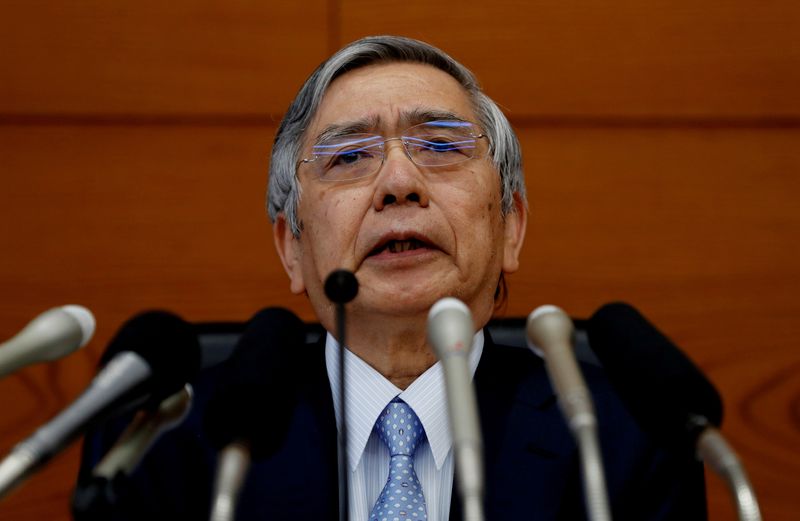BOJ Governor Kuroda’s comments at news conference
2022.10.28 04:00
[ad_1]

© Reuters. FILE PHOTO: Bank of Japan (BOJ) Governor Haruhiko Kuroda attends a news conference at the BOJ headquarters in Tokyo, Japan July 30, 2019. REUTERS/Kim Kyung-Hoon
(Reuters) – The Bank of Japan kept ultra-low interest rates on Friday and maintained its dovish guidance, cementing its status as an outlier among global central banks tightening monetary policy, as recession fears dampen prospects for a solid recovery.
As widely expected, the BOJ left unchanged its -0.1% target for short-term interest rates and a pledge to guide the 10-year bond yield around 0%.
Following are excerpts from BOJ Governor Haruhiko Kuroda’s comments at his post-meeting news conference, which was conducted in Japanese, as translated by Reuters:
YEN WEAKNESS
“It’s extremely important for exchange rate moves to reflect economic and financial fundamentals. Recent sharp, one-sided drop in yen heightens uncertainty for Japanese companies, so are bad for the economy.”
FACTORS TO WATCH
“There are various uncertainties that could either push up or down prices, such as the outlook for wages and corporate price-setting behaviour. We need to scrutinise these factors.”
WAGES
“We expect wages to gradually rise, reflecting recent inflation. But we’d like to look at not just numbers but the mechanism at which wages and prices are moving.
INFLATION
“For now, we don’t expect inflation to stably and sustainably achieve 2% target next fiscal year.”
JAPAN ECONOMY
“I don’t see the weak yen offering a big opportunity for Japan’s economy. The weak yen is pushing up import costs for commodities, thereby driving up consumer inflation. Such price hikes aren’t the kind of inflation we’re seeking as they are not accompanied by wage growth.”
BOJ’S INFLATION FORECAST UPGRADE
“There’s increased weight on the chance inflation will rise accompanied by wage gains. It’s true we’re getting closer to stably and sustainably achieving 2% inflation. But we’re not there yet.”
IMPACT OF GLOBAL ECONOMIC SLOWDOWN
“It’s true slowing overseas growth could weigh on exports and output. But exports and output are likely to remain at high levels as supply constraints ease … Even with the impact from the overseas slowdown, Japan’s economy is likely to recover.”
JAPAN’S NEUTRAL RATE
“It’s hard to say because it depends on Japan’s potential growth rate. But what we can say is that Japan’s current interest-rate levels are below the neutral rate. That, in turn, is stimulating the economy.”
EXIT STRATEGY
“We don’t plan to raise interest rates or head for an exit (from easy policy) any time soon. But if achievement of 2% inflation comes into sight, the board will of course debate an exit policy. When that happens, it’s very important to communicate the BOJ’s intentions to markets. The exit strategy must obviously be communicated clearly to markets and the public. For now, I don’t think we’re at a stage of seeing inflation stably and sustainably achieve our 2% target.”
YIELD CURVE CONTROL
“I don’t think yield curve control is behind the yen’s drop … YCC is one way of pursuing monetary easing. It’s not as if YCC has a different impact on currency moves than quantitative easing. Markets are focusing on interest rate differentials. But there’s no clear co-relation between the interest rate differentials between the United States and other countries, and currency moves.”
IMPACT OF WEAK YEN
“Based on macro-economic models, if the yen’s decline is steady it would have a positive impact on the economy. At the same time, the impact of a weak yen varies on each sector, economic entity, and the size of companies. As for recent yen drop, they are rapid and one-sided, so have an undesirable impact on the economy.”
RECENT DISTORTIONS IN JAPAN’S YIELD CURVE
“We have two targets – one for short-term interest rates and another for the 10-year bond yield – to create an appropriate shape of the yield curve. I think the targets are sufficiently achieving what we’d like to see (on YCC).”
[ad_2]
Source link








